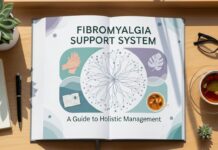Introduction
Hearing the words chronic kidney disease stage 3 can be loaded. You could imagine being at the hospital numerous times or you fear your life will change overnight. But that is not the full story. Many people at this stage have an active and purposeful life. The key is awareness and action.
Your kidneys may not function at 100% right now, but you still have control. “With proper actions, you are able to slow down damage and preserve your body.” This article will provide you with a way to follow everyday habits, diet tips, energy management, and ways to deal with the related health conditions.
Staying healthy starts with awareness. Learn about lifestyle changes to prevent Alzheimer’s disease, the first symptoms of Parkinson’s disease, and the early signs of thyroid cancer in women to catch problems early.
What Stage 3 Really Means
Kidney function is assessed by a number called a GFR. At stage 3 this number is between 30 and 59. That means your kidneys are at about half their usual strength.
You might notice some swelling in your ankles, being more tired or even some changes in your urination. But stage 3 is not failure. This is a canary in the coal mine for your body, alerting you that your body needs constant attention. Many people linger on this stage for years with the proper habits in place.
The goal now is not fear, but, instead, balance. By doing this and protecting your kidney from further straining, you are giving them more time.
Why Small Choices Matter
Every organ in your body depends on your kidneys. They filter wastes, regulate the amount of fluid in the body and balance blood pressure. When they weaken, it is felt on other organs.
This is why small choices that you can make each day are more important than ever before. Drinking water regularly, eating fresh foods instead of processed ones and staying active can make a huge difference. Think of it like a garden you need to feed. If you supply it with water and take care of it daily, it grows and grows.
With kidney disease, it is the same with your body. Slow progress now will ensure stability eventually.
Diet: Your Strongest Ally
Food has a direct impact on kidney health. At this stage 3, your objective is to decrease additional workload while giving your body with needed energy.
Core Nutrition Targets
- Lower sodium for protection of blood pressure.
- Eat moderate protein without putting a strain on kidneys.
- Avoid high phosphorus containing foods.
- Watch potassium-rich food to avoid strains in heart.
Example of Balanced Choices
Try oatmeal, berries and almond milk for breakfast. Lunch in a wrap-Grilled chicken, lettuce and cucumber salad served in a wrap. Dinner: Baked salmon, rice and steamed green beans. These meals are simple, filling and safe for your kidneys.
Restriction is not the only focus. It is about switching troubling foods for nourishing ones.
Salt and Kidney Stress
Salt-or sodium-is all around us in packaged meals. Too much sodium attracts water to your blood vessels. This causes the blood pressure to be higher, and the blood pressure forces kidneys to work harder.
Cooking at home is the most important way to control the salt. Use light seasonings such as herbs, garlic or lemon for flavor. Reading labels prior to purchases of canned or frozen food can infer another.
Managing daily challenges matters too. Tips for coping with type 2 diabetes fatigue and a routine to reduce arthritis knee flare-ups can improve comfort. Also, untreated atrial fibrillation can raise stroke risk, making timely care vital.

Protein: How Much Is Enough?
Protein helps to build muscles and keep you strong. But in great amounts, it generates waste that your kidneys have to clear. The solution is balance.
Choose lean meats e.g. chicken or fish. Foods like beans or lentils can also help but portion control is also key. Your doctor or dietitian will possibly recommend the correct amount per day based on your weight.
The Role of Exercise
Exercise may be difficult when you are tired, but movement protects your health. It lowers blood pressure, controls weight and helps your heart along. All this means simpler life for your kidneys.
You don’t have to have strenuous workouts. Walking 20 minutes or light stretching or gentle yoga is enough. Even small activities such as gardening or slow cycling help to improve circulation.
Avoid pushing too hard. Heavy lifting or overtraining may take a toll on your body. Try to concentrate on steady, regular movement.
Completing Daily Living Activities w/o Tiredness
Feeling tired is common when in stage 3. This can be attributed to anemia, build-up of waste, or even certain ailments such as type 2 diabetes fatigue lifestyle issues. But tiredness is not an excuse for an individual to cease leading a full life.
Create a rhythm for your day. Sleep at the same time every night. Eat small balanced meals, not heavy ones. Short naps can make you feel refreshed, without interfering with your night-time rest.
Your doctor may check to see if you are anemia and suggest treatment. As your energy improves, so therefore you have more control over your activities.
Treating Overlapping Condition
Kidney disease is seldom a loner. Many people also struggle with arthritis, problems with their liver or sleep. Addressing them also helps in protecting your kidneys.
- How to prevent arthritis knee flare-ups during the day: Stretching, warm compresses, and weight management eases pain.
- Managing chronic migraine without medications: Hydration, stress control and routine rest reduces attacks.
- Diet plan for non-alcoholic fatty liver disease: Eat well. Routine food based on fresh vegetables, lean proteins, and low sugar meals.
- Exercises for COPD patients: Slow breathing workouts and seated exercises improve lung strength.
- Sleep hygiene for Fibromyalgia: A cooled, dark room and screen-free nights go a long way for pure sleep.
Your body works as a system. Supporting part of something often takes pressure off another part.
A Day in Balance
A kidney-friendly day might look something like this:
- Morning: Morning stretch, water and light breakfast.
- Midday: Restful walk and fresh lunch.
- Afternoon: Rest, reading or meditation.
- Evening: Light exercise then dinner of lean protein.
- Night: Calm-down time & regular going to bed time.
This is not about being very strict about timetables. It’s about providing your body with consistent care on a daily basis.
Emotional Side of Kidney Disease
Living with stage 3 can be stressful. Worrying about the future is natural. But stress, itself, damages your body.
Talk to loved ones about your concerns. Joining a support group, local or on the internet, is comforting. Some find that journaling, or light meditation, helps.
You are not alone in this journey. It is the way that helps to make it all easier.
Advantages and Disadvantages to Lifestyle Migraines
| Pros | Cons |
|---|---|
| Slows kidney decline | Requires daily commitment |
| Boosts energy and mood | Diet changes may feel strict |
| Protects heart and liver | Needs planning ahead |
| Improves long-term stability | Regular doctor visits required |
The advantages outweigh the challenges. These habits will get more easy and automatic as time passes.
Treatments may bring side effects. Be aware of neuropathy from prolonged chemotherapy and explore autoimmune pancreatitis treatment in children to support better care choices.
Regular Medical Care is Important
Regular check-ups are your shield. At stage 3, your doctor checks your kidney function every few months. Tests include blood work for creatinine, GFR and hemoglobin levels. Urine tests are done to check for protein, or infection.
This monitoring allows problems to be detected early. High blood pressure, anemia, or bone weakness, can be treated before they get worse. Never be late for appointment. They provide you with a great idea of progress and save you from being hit by surprises.
Medicines and Kidneys
Most people at this stage require medicine. Common ones include drugs for blood pressure, diabetes control and cholesterol management. Sometimes, phosphate and vitamin D supplements are added.
Always handle according to instructions. About your course of antibiotic therapy, they should say: “Do not alter doses without medical advice.” Some pain relievers, namely, NSAIDs can damage kidneys. Talk to your doctor before taking a new medicine.
If you are dealing with multiple conditions, make yourself a list of all medications. This serves to prevent harmful drug interactions.
Blood Pressure and the link to Kidneys
High blood pressure is caused by and results from kidney disease. At stage 3, stabilizing blood pressure is critical. Personal goals may be established by your doctor, but target levels are commonly 120/80.

Certain lifestyle changes, such as limiting salt, daily exercise and maintaining a healthy weight help medication work. As a result of this combination of lifestyle and medicine, blood pressure becomes more manageable.
Blood Sugar Management
Stage 3 is often accompanied by type 2 diabetes, a very common complication for diabetes patients. Uncontrolled diabetes encourages the development of kidney disease. The key is balance. Eat regular meals, sugar in moderation and remain active.
Home blood glucose monitoring is a great way to gain insight into your patterns during diabetes. If fatigue is an issue, link it with type 2 diabetes fatigue lifestyle tips. Higher energy levels since blood sugar is maintained.
The Role of Hydration
Water ensures the function of your kidneys. But the right amount matters. A shortage in water makes the toxins build up higher. Too much water can result in swelling and strain.
Your doctor may be specifying daily fluid goals as well. Drink frequent sips of water throughout the day instead of guzzling large amounts of water. Avoid soft drinks and especially colas as they contain phosphorus. Herbal teas or infused water of cucumber or mint is a refreshing alternative.
Mental Health and Kidney Disease
And physical health and mental health go hand in hand. It is common to be fearful, stressed, or sad when you are in stage 3. Anxiety about the future can make sleeping more difficult.
Tackling mental health isn’t a sign of weakness. It is strength. One of the benefits of getting in touch with a counselor or a kidney support group is that it helps you feel better emotionally. Meditation, yoga, breathing exercises and walking in the soft sunlight also help soothe the mind.
Positive habits reduce stress hormones, which is directly applicable to your kidneys.
Sleep and Recovery
Sleep is healing. A poor sleep limits kidney function and increases blood pressure. A good sleep routine is a must.
This ties in with sleep hygiene for fibromyalgia, according to which regular rest reduces pain and stress. The same rules apply here: keep your room dark; no screens before bed; keep your sleep hour consistent.
Nighttime sleep is a must, but daytime sleep is okay, as long as it’s not long enough to disrupt your resting.
Being Engaged in Social Living
Chronic disease can cause you to isolate. But keeping busy is part of healing. Spending time with friends, volunteering or getting into community groups helps enhance mood.
Isolation, on the other hand, makes us more stressed and exhausted. Even simple interactions despite low energy. A telephone call, a quick walk with a neighbor, a meal together with extended family members keeps you connected.
Your health is more than just physical figures. It is also joyful, laughing and purposeful.
Nutrition Beyond Basics
Stage 3 is not about diet pill regimen. It’s a question of balance and variety. But, some foods are worth giving attention to.
Safe Choices for Daily Meals
- Fruits and vegetables such as cucumbers, lettuce, and bell peppers.
- Fruits that are low in potassium such as apples, grapes, and berries.
- Rice, pasta or white bread for controlled energy.
- Olive oil for healthy fats.
Limit processed meats, packaged snacks and sugar-containing drinks.
Many of these foods support the kidneys but also the liver, joints and digestion. Furthermore, share similarities with a diet plan for non-alcoholic fatty liver disease, making them a beneficial eating regimen for those coping with both issues.
Helping to Keep Bones and Heart Strong
Stage 3 sometimes has influence on calcium and vitamin D metabolism. Weak bones and stress on the heart may result. For that reason, physicians routinely test for mineral levels.
Getting some sunlight while walking outside produces natural sources of vitamin D. Low-impact strength training is also good for protecting bones. This corresponds to exercise used for arthritis flare-ups of the knees, where movements, although gentle, supply mover of stiffness and strength.
Breathing and Lung Health
Kidney disease-This can impact fluid balance, and in some cases makes it more difficult to breathe. This is where healthy habits in your lungs come in handy.
Worlds simplest exercises like pursed-lip breathing or simply stretching while sitting down help with the oxygen flow. These are like exercises for patients with Chronic Obstructive Pulmonary Disease (COPD) where patients slowly complete exercises while blowing out as this helps strengthen the lungs. Just five minutes a day can be helpful.
Tracking Progress
It’s powerful once you start a journal. For example, write down what you eat, how much you drink, how much energy you have, and how well you sleep. Over time, patterns appear. You’ll understand what foods or activities do good to you.
This also comes in handy whenever you go see the doctor. With clear notes, your healthcare team will be able to better adjust your plan.
Inspiring Case Example
Please consider Maria, age 56 years who as of five years earlier had been diagnosed with stage 3. At first she experienced great fatigue and edema. But with consistent effort, she slowed the development of her disease.
She changed her eating habits to low sodium, walked 40 minutes every evening and engaged in mindful meditation. She also became a member of a kidney support group. Today, her kidney function is still stable and she continues to enjoy her hobbies.
Her story proves that stage 3 is not final. It is a turning point.
Advantages and Disadvantages of Medical and Lifestyle Balance
| Pros | Cons |
|---|---|
| Prevents fast kidney decline | Regular monitoring needed |
| Improves energy and stability | Medication side effects possible |
| Supports mental health | Requires lifestyle discipline |
| Reduces complications like anemia | Ongoing effort needed |
Karma is never perfect but the positive outshines the boundaries.
Planning for the Future
Living with stage 3 kidney disease means you now have to prepare yourself for the years ahead. We cannot guarantee a cure, but we can offer you peace of mind by having a plan of action. Armed with various choices you remain calm and focused.
That means more than just medical decisions–long-term care planning involves lifestyle changes and emotional preparation that are needed when we lose mobility and function. It does not mean giving up. It also means being three steps ahead.
Developing a Long Term Care Team
Your doctor is not the only person you have to rely on. A good care team may include:
- A specialist in the care of your kidneys (nephrologist)
- A meal planning dietician
- A primary care physician
- A mental health counselor
- Family or close friends
Each person among you contributes to your health in some way. Together, they provide you with support, encouragement and structure.
Monitoring Warning Signs
In stage 3, the symptoms can be mild but changes should be monitored. The symptoms of severe heart failure are edema in the legs, shortness of breath, nausea or unexpected weight gain.
Call your healthcare provider right away, if these happen. Early motion helps to avoid complications. Trust your instincts. If something doesn’t seem OK, don’t wait.
Preventing Complications
Kidney disease increases the risk for heart disease, loss of bone strength, and anemia. You can reduce this risk with consistent practices. Take a balanced diet, undergo regular exercise and also adhere to the drug given.
When conditions merge, they need to be handled together. For example, if you suffer from arthritis, customize your arthritis knee flare-ups daily routine to safeguard joints while remaining active. For people who suffer from migraines, natural ways to treat chronic migraine exist without drugs, like rehydration and managing stress levels.
Each healthy option will protect you from additional complications.
Why Testing is so Important
Stage 3 is about working in the lab regularly. These tests include GFR, blood sugar, calcium and other markers. They help your doctor to modify treatment.
Skipping tests means that you miss changes that may have an impact on your health. Keep appointments-Even if you feel fine, make appointments. Silent changes can often occur before symptoms become apparent.
Making Your Home Kidney Friendly
Your health is influenced by your environment. A kidney-friendly home is clean, organized and stress-free. Have implied livings foods in kitchen. Limit processed snacks. Make sure the area for sleeping is dimly lit and quiet.
Small additions to around the home such as indoor plants or stress-reducing music also help with mental health. Stress reduces in a peaceful atmosphere, which makes your kidneys to work more efficiently.
Family and Social Support
Life with kidney disease can be isolating. Family support has from this perspective an immense significance. Having meals together, walking together, or visiting friends or loved ones gives you the push in the right direction.
And support prevents being burnt out. Family members can remind you to take your medicine or prepare kidney-friendly foods for you. Family allows your health journey to be easier and less lonely.
Being Positive: Selecting Goals for Every Day
Kidney disease can make life seem uncertain. Small daily goals provide structure and hope.
Some of the simplest goals can involve walking for 15 minutes, drinking water at designated times of the day, or cooking a healthy dinner. Reaching small goals is a confidence booster. In time, these victories combine to create long-term gain.
Technology and Kidney Care
Today’s technology makes kidney disease the easiest thing to treat. Apps monitor blood pressure, water intake and medication timings. Some models even report to your doctor directly.
Technology also bridges gaps for you to form online communities. Many people who have stage 3 feel empowered by sharing experiences. Virtual support helps ensure you don’t feel isolated, and keep you up to date on new tips.
Emotional Resilience
Fear of the progress is widespread. But resilience occurs by focusing on what you can control. Breathe deeply, give thanks and celebrate making small wins.
If you are suffering with depression or anxiety, seek help early. Counseling/group therapy provides advice. Keep in mind that mental health is just as important as physical health in kidney care.

Learning from Others
Hearing true stories is motivating. One patient benefited from health improvements by repurposing diet as per a diet plan for non-alcoholic fatty liver disease, which also benefited her kidneys. Another focused on shallow breathing exercises similar to those done with exercises for patients with Chronic Obstructive Pulmonary Disease (COPD), in order to relieve fatigue.
Every story just shows you aren’t alone. Others are on the same path or perhaps success is possible with persistence.
Strategies for Self-Care – Advanced
Self-care is not only about food and exercise. That means: protect the entirety of your lifestyle.
- Mindfulness: We learn that mindfulness lowers blood-pressure and reduces stress.
- Vitamin D: Improves mood and exposure to sunlight.
- Regular appointments: Ensures health is not derailed.
Perfect is nothing but consistency has more power. Small steps every day help to protect your kidney over the years.
Frequently Asked Questions
How much longer do you live with stage 3 kidney disease?
Life expectancy is affected by your health status, lifestyle, and other factors. If cared for appropriately, many people survive into an extended life without the experience of kidney failure.
Can nutritional adjustments prevent stage 3 from occurring?
Diet will not cure kidney disease but can slow damage. Following low sodium, balanced meals provides for long-term stability.
How much protein should I eat?
Protein needs vary. In general, moderate amounts are suggested. Your doctor or dietitian will provide you with specific limits per day.
Can exercise harm kidneys?
Light workout is beneficial, not damaging. Stretching, yoga, and walking are safe. Do not lift heavy objects without your doctor’s advice.
Advantages and Disadvantages of Long Term Planning
| Pros | Cons |
|---|---|
| Reduces stress about the future | May feel overwhelming at first |
| Supports stable kidney health | Requires ongoing effort |
| Encourages family involvement | Some lifestyle limits remain |
| Builds confidence and resilience | Regular monitoring is necessary |
Planning does not cause a loss of liberty. It gives you more control.
Final Thoughts
Stage 3 kidney disease is not a death sentence. It has become the beginning of a new chapter that needs to be balanced, weighed, and hopeful. It is by building the combination of medical care, lifestyle and emotional resilience that you can create a strong foundation for the future.
Remember: every healthy choice today, makes your kidneys stronger tomorrow. Live in every moment, live in every way, guard all your body step by step.









